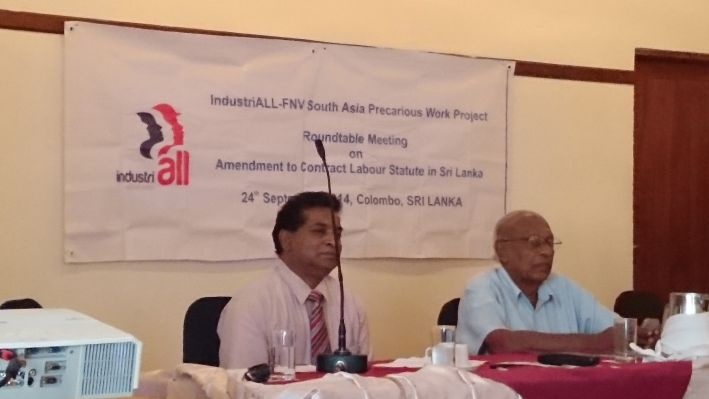Read this article in:
English
7 October, 2014As part of the ongoing efforts to change the Sri Lankan law in regard to precarious work, a workshop was held on 24 September in Colombo, Sri Lanka.
Organized within the framework of the FNV Mondiaal supported IndustriALL South Asia Precarious Work project, the meeting participants discussed a series of amendments to the labour law of Sri Lanka. These amendments, brought forward by the Sri Lankan trade unions, primarily aim to address the omnipresent problem of contract labour in the country. Employers’ and government representatives took part in the meeting as well.
The main idea of the suggested changes is to create mechanisms preventing use of contract labour as a way to avoid real employment contracts. The unions want to make it so that all precariously “self-“ employed contract workers in Sri Lanka become regular employees with decent labour contracts.
The proposed legislation, which has been agreed on by both trade unions and employers, states that any contract of any person who “enters into a contract or work arrangement for trade or commercial purposes” with any other person who employs the worker “to perform work on a regular basis which is an integral part of the business activities” is to be seen as a disguised employment relationship.
As things currently stand, the Sri Lankan labour legislation has a long way to go. It may refer to a few precarious work situations, but certainly does not extend to all precarious workers. For example, there is neither regulation on the length of temporary work contracts, nor on how many times these can be renewed. Besides, there are no limitations of temporary agency labour, which can be used anywhere and anytime, without any responsibility being taken by the user-enterprise. In terms of a concrete example, workers who have been working less than 6 months are not covered by the standard dismissal rules.
The explanations above illustrate why more than half of all employees in Sri Lanka are labelled temporary or casual workers (54 per cent). 92 per cent of those are to be found in the private sector. Between 2006 and 2012, temporary and casual workers in the private sector increased by 21 per cent, while permanent employees increased only by 5 per cent.
The IndustriALL affiliates in Sri Lanka are planning a series of activities to deal with precarious work related problems. One step is to attract attention to the problem on and around October 7, the day that IndustriALL calls on all its affiliates to highlight the fact that precarious work is not a sustainable option.


